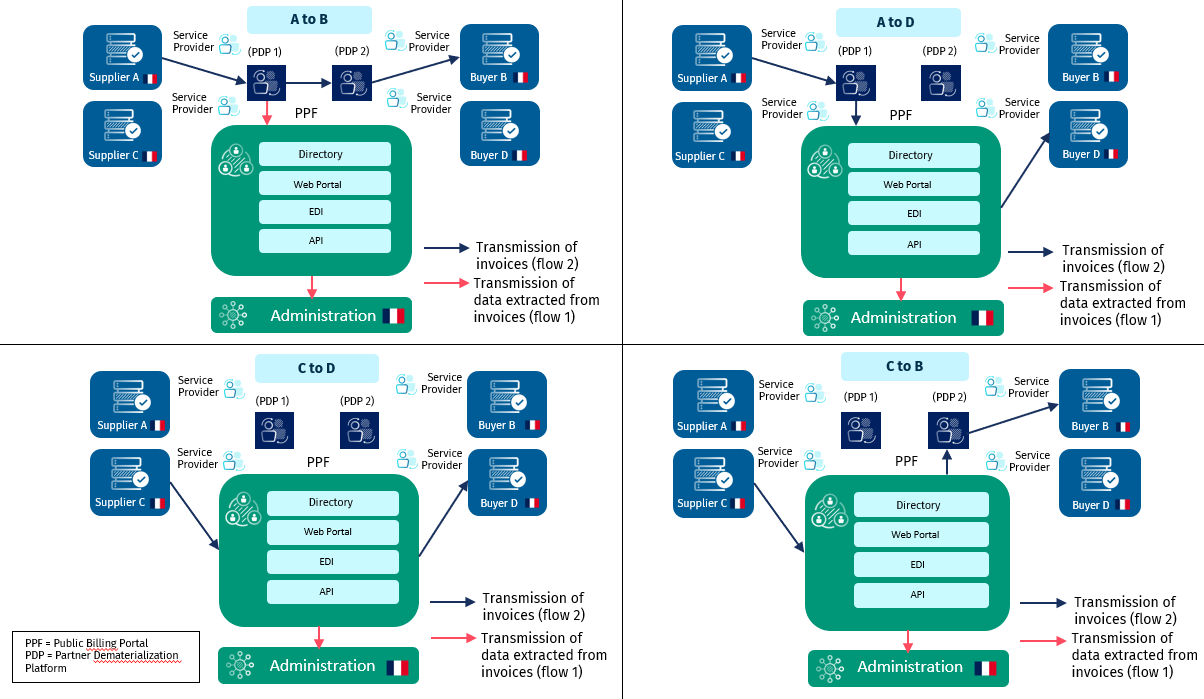- e-Invoicing Compliance News Blog
- Electronic Invoicing: Everything you need to know about Plateforme Agréée (PA)
Electronic Invoicing: Everything you need to know about Plateforme Agréée (PA)
Blog title: Electronic Invoicing: Everything you need to know about Plateforme Agréée (PA)Mar 10, 2023 03:11 PM
Electronic invoicing will gradually become mandatory in France for all companies subject to VAT, both for incoming and outgoing invoices. Plateforme Agréée (PA) will play a key role in the implementation of this reform. Basware takes a look at what the French government requires from these platforms and what changes this will mean for large companies, which will have to be ready by 1 July 2024.
The "Y" Model: A Mixed System for Electronic Invoicing
The "Y" model, which does not require businesses to use a public platform to send or receive invoices, has been favored by the French government, unlike other European countries. As of 1 July 2024, companies subject to VAT will therefore be free to choose, for both sending and receiving, between:
- A Plateforme Agréée (PA) which must be approved by the Administration beforehand.
- The Public Invoicing Portal (PPF), accessible free of charge by all VAT-registered parties (both senders and receivers of invoices), which offers a minimum set of services to private companies for exchanging their electronic invoices. This base is not suitable for companies that manage several hundred or even thousands of invoices each year, both incoming and outgoing.
What Role will Plateforme Agréée Play?
Plateforme Agréée (PA) will be managed by private service providers approved by the French government for a renewable period of three years. They will play a central role as intermediaries between businesses and the administration:
- Receiving and issuing electronic invoices and making them available to their recipients;
- Conversion of invoices issued by suppliers into a structured and compliant format (UBL 2.1, UN/CEFACT CII or Factur-X) suitable for their customers;
- Guarantee of invoice data integrity, authenticity, legibility and completeness at all stages (during exchanges, storage and archiving of invoices);
- Checking the conformity of invoices, transaction data and information (identity of senders and receivers, amounts, legal mentions) before transmitting them;
- Extraction and transmission to the tax authorities of certain invoice data (e.g. identification of the supplier and the customer, amount exclusive of tax and VAT of the transaction, amount of VAT due, VAT rate applied, etc.);
- e-reporting: transmission of transaction data not covered by mandatory electronic invoicing (B2C and cross-border invoices) to the Administration;
- Transmission of invoice status (submitted, rejected, received) and payment data for all transactions;
- Sending business directory update information to the Public Invoicing Portal (PPF).
What Role will the Public Invoicing Portal Play?
At the heart of the reform, the Public Invoicing Portal (PBP) will perform several tasks:
- Manage the directory of all companies (private and public);
- Connect with all Plateforme Agréée (PA);
- REceive electronic invoices and B2B billing data for transmission to the tax authorities;
- Transmit data from transactions not covered by mandatory electronic invoicing (B2C and cross-border invoices) to the tax authorities (e-reporting);
- Receive information on the status and payment of invoices.
Invoice and Data Flows: Summary of the Different Cases

Mandatory Electronic Invoicing: What's New for Businesses
For large companies that are already equipped with an electronic invoicing or automated supplier invoice processing solution, they should check now that their supplier(s) has (have) taken the necessary steps to be approved by the Administration as a PA. This is the case for Basware, which is also an active member of the working groups preparing the reform with the French Public Finance Department (DGFIP) and the National Electronic Billing Forum (FNFE).
For those who are not equipped, they must prepare for this reform now to give themselves time to meet the deadline of 1er July 2024. As the deployment of an e-invoicing or AP Automation solution takes several months and involves many departments (accounting/finance, IT, sales, legal, etc.), it is recommended that large companies start now. Ideally, it is preferable to choose a Partner Dematerialization Platform that will be able to manage both flows (receiving and sending electronic invoices), as well as e-reporting, to reduce the risks inherent to the multiplication of suppliers.
More on France e-Invoicing Mandate
To learn more about mandatory e-invoicing in France beginning in 2024, checkout our dedicated website page. Or if you’d like to talk to our experts to prepare for this reform and discuss your needs, please contact us.
Basware does not provide tax, legal or accounting advice. This product compliance documentation is protected by Basware copyright, is made available for information purposes only, without any guarantee or warranty, is not binding upon Basware and can be updated by Basware at any time, without notice. This documentation is not intended to provide, and should not be relied on for, tax, legal or accounting advice. You should consult your own tax, legal and accounting advisors before engaging in any transaction.

